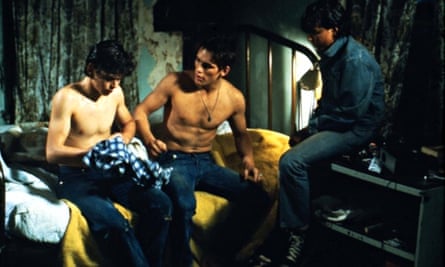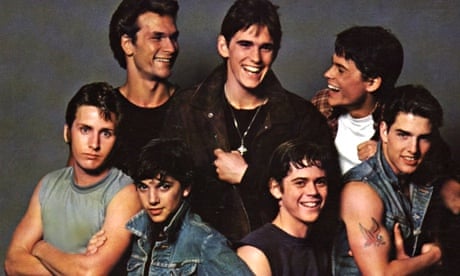As a Muslim growing up in an asbestos-ridden council estate in Fulham, south-west London, seeing all the posh houses from our third-floor balcony, heroes were hard to find. Until I saw Matt Dillon in The Outsiders.
Dillon played Dallas Winston, a Greaser, whose enemies are the Southside Soc, kids with money. Dallas was from the wrong side of the tracks. For most people, Dallas would be an odd choice for role model. Even his friends use his name as a warning. In the "Complete Novel" version of the film released in 2005 (and now, sadly, the only version available on DVD), Sodapop Curtis's last word on Dallas is to counsel his younger brother, Ponyboy, "When you ain't got nothing, you end up like Dally, I don't mean dead either, I mean, how he was before."
I'm glad that those words by Sodapop (Rob Lowe) were not in the cinema version released in 1983 that I grew up with and watched more than 100 times by the time I was 15. Because I would have been disgusted with thisdamnation of Dallas.
Director Francis Ford Coppola tries to make Dallas look like a jerk. Dallas bullies the local Tulsa kids. The beautiful Sherri "Cherry" Valance, played by Diane Lane, complains after she throws a drink in his face following some crude pick-up lines, saying: "he scared me to death". He's just out of jail and already fighting. When he does good deeds, it's reluctant. Yes, he helps to save some children in a church fire, but it's because he wants to protect his friends rather than any altruism. When Johnny dies, he can't control his grief and robs a store. His death seems inevitable. His is a cautionary tale; he is a loose cannon deserving of Sodapop's dismissal.

Well that's the usual reading of the character. But in my eyes, Matt Dillon offered the keys to gaining acceptance in mainstream western culture.
The original cinema-release version opens with Dallas standing on a street corner. I knew, watching him then, that my life was about to change. I'm in awe of Dallas before he opens his mouth: that's because he's played by Dillon, who in 1983 was the biggest name in a cast that included Rob Lowe, Tom Cruise and Patrick Swayze. A few years older than I was, Dillon was successful and good-looking – the epitome of cool. More crucially, his acting success was garnered in roles in which he played the underdog. Only Dillon could have made Dallas a hero. Perhaps it's no surprise that my desire to acculturate led me to see a hero in a white character.
Dallas wears cool clothes. He wants to do "nothing legal" and, prophetically to my life at least, he just wants to go see a movie, not caring which.
Revisit the scene when Dallas meets Cherry at a drive-in. This isn't a boy failing to pick up a girl. I saw a working-class kid refusing to be overawed by money and social class. There is a brash self-confidence. The pick-up lines may be crude, but he wants to level the field. Contrast this to the moment where fellow Greaser Two-Bit throws away rich-kid Marcia's phone number because girls like her would never date someone like him. Watching Dallas, even as he fails to woo Cherry, I saw that the seemingly out-of-reach was obtainable. He only has respect for himself, not for the rules.
Dallas is streetwise, too. When Johnny and Ponyboy get involved in a murder rap it's to Dallas they turn. And look where he lives. Above a bar: Tom Waits answers his door. Dallas walks around shirtless. As he does so, a young woman in the bar swoons. He relays brilliant instructions about a hideaway. In the right circumstances he's the wisest man in the world.
He's also a man of his word. He turns up at the appointed hour to help his friends. He drives a cool car, showing his desire to climb the social ladder. He's fearless, leaving his hospital bed because "there ain't no rumble without me". I understood the code that Dallas lived by. I understood the code that Dallas lived by: For him it was the Greasers; for me the ummah, the Muslim community. Honour and fearlessness were lessons drilled into me at home.
Yes, he self-destructs when Johnny's heroism ends in his death, but that's because Dallas can't cope with how unfair society is. His gut reaction is born of love. But even here, I saw lessons. Dallas is like the popular kid in school, perfect in one environment, but unable to adapt to the outside world. If only he could have taken his positive attributes and applied them elsewhere he could have stayed gold and prospered.
My sixth-form school report said: "Kaleem wants to conform to the high academic standards expected of him, but also to be a bit of a rebel. I hope the tension between these two sides of his character remain on the whole constructive." Without Dillon/Dallas I would not be writing this today.

Comments (…)
Sign in or create your Guardian account to join the discussion